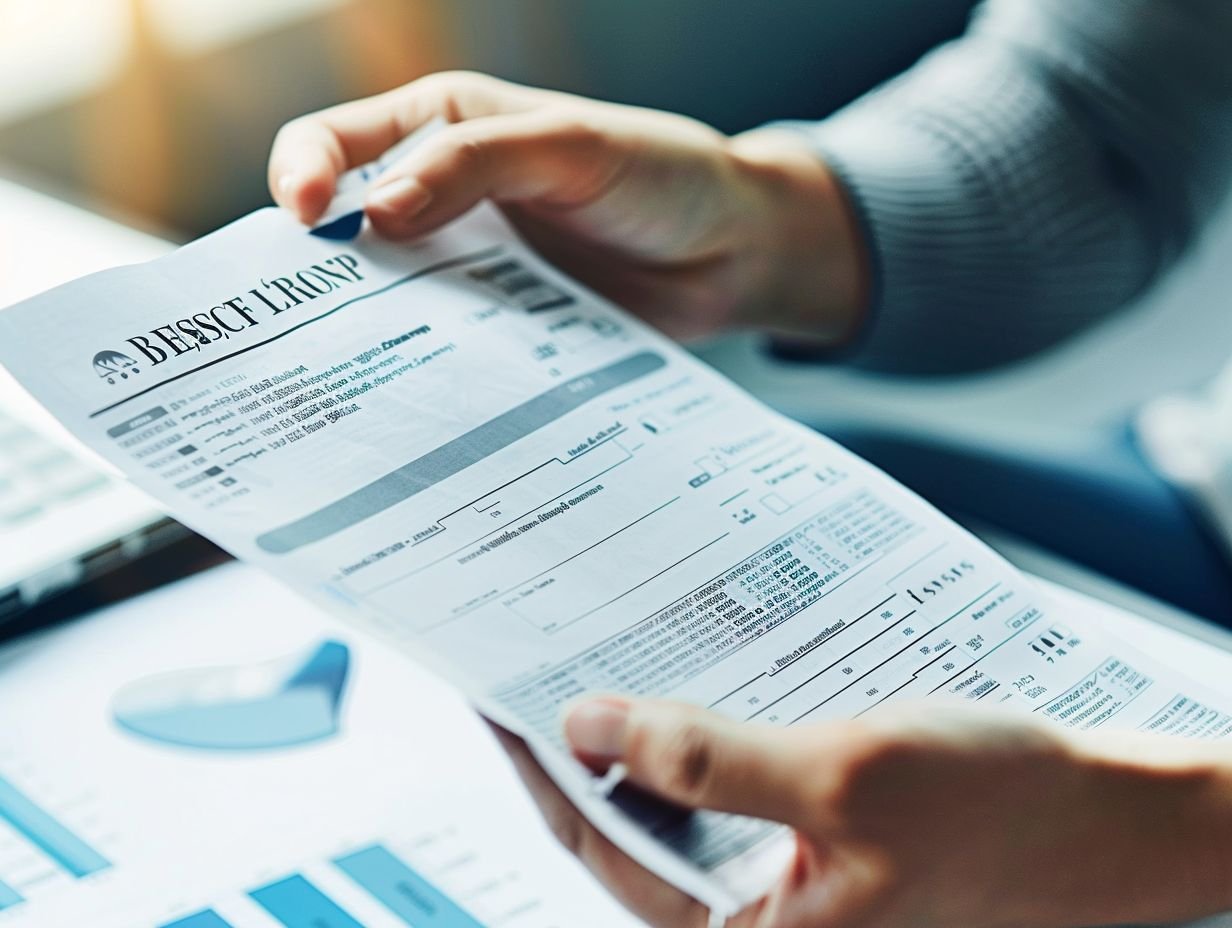Are you considering taking out a business loan but worried about how it may impact your personal credit?
In this guide, we will explore the different types of business loans available, how they work, and most importantly, how they can affect your personal credit score and history.
We will also discuss the key factors that determine this impact and provide practical tips on how you can protect your personal credit when seeking financing for your business.
Let’s dive in and demystify the relationship between business loans and personal credit.
Table of Contents
ToggleWhat is a Business Loan?
.jpg_00.jpeg)
A business loan is a financial product specifically designed to provide funding to businesses for various purposes such as expansion, inventory management, or operational needs. Business loans can have a significant impact on the financial health of a company and may affect the personal credit of the small business owner if they provide a personal guarantee.
When a business owner takes out a loan to support their company, the repayment history and credit utilization of that loan can influence their personal credit score. This interconnectedness highlights the importance of managing business finances responsibly to safeguard personal creditworthiness.
A strong business credit profile can open doors for future financing opportunities and enhance overall financial stability. On the flip side, neglecting loan repayments or defaulting on business loans can lead to negative repercussions, impacting both the business’s financial standing and the owner’s personal creditworthiness.
How Does a Business Loan Work?
The process of how a business loan works involves a small business owner applying for financing from a lender based on their borrowing capacity and creditworthiness.
During the lender evaluation process, various factors such as the business’s revenue, cash flow projections, industry trends, and the owner’s personal credit score are taken into account. Lenders also assess the purpose of the loan, the collateral provided, and the overall financial health of the business.
The borrower’s business plan, management team expertise, and potential for growth play significant roles in influencing the loan approval decision. Once approved, the borrower is responsible for adhering to the agreed-upon loan terms, making timely repayments to maintain a good credit standing, and managing financial risks effectively.
What Are the Different Types of Business Loans?
There are various types of business loans available to small business owners, each tailored to different financial obligations and purposes. These include term loans, SBA loans, business lines of credit, equipment financing, and invoice financing, each serving specific needs of the business.
- Term loans are traditional lump-sum loans with fixed interest rates and set repayment terms, suitable for long-term investments like purchasing real estate or equipment.
- SBA loans, backed by the Small Business Administration, offer lower interest rates and longer repayment periods, aiding startups and small businesses.
- Business lines of credit provide flexible borrowing limits allowing businesses to access funds as needed.
Understanding the characteristics of each type of loan is crucial in managing debt effectively and meeting financial obligations for sustainable business growth.
Term Loans
Term loans are a common type of business financing where a lump sum is borrowed and repaid over a predetermined period with set interest rates. Companies need to manage their loan utilization effectively and maintain a positive loan repayment history to ensure future access to credit.
Repayment terms for term loans typically vary, spanning from a few years to even a decade, allowing companies a structured way to repay the borrowed amount. Interest rates can be fixed or variable, impacting the overall cost of borrowing.
A good loan repayment history is crucial for demonstrating financial responsibility, as lenders often closely evaluate this when assessing the creditworthiness of a company. By making timely payments and staying on track with loan obligations, businesses can enhance their credibility and potentially secure better terms for future financial needs.
SBA Loans
SBA loans are government-backed loans that require personal financial responsibility and may impact personal credit if not managed properly. Understanding the implications of SBA loan disbursement and repayment is crucial for small business owners.
These loans can provide the necessary capital for businesses to grow and expand, but it’s essential for borrowers to handle them with care.
For individuals seeking SBA loans, it’s important to maintain disciplined financial practices to avoid negative effects on their credit score. Failure to make timely payments or defaulting on the loan can significantly harm one’s creditworthiness and future borrowing opportunities.
By using these funds responsibly, small business owners can not only boost their ventures but also enhance their financial standing in the long run.”
Business Lines of Credit
Business lines of credit provide businesses with revolving credit limits that can be used flexibly. Monitoring the credit utilization ratio and having access to credit monitoring services are essential for maintaining a good creditworthiness assessment.
By keeping a close eye on the credit utilization ratio, businesses can ensure they are not exceeding their credit limits and are utilizing their available credit responsibly. Credit monitoring services play a crucial role in alerting businesses to any changes in their credit reports, enabling them to address any potential issues promptly.
Regular assessment of creditworthiness allows businesses to identify areas for improvement and work towards building and maintaining a strong credit profile, which can positively impact their credit ratings and overall financial health.
Equipment Financing
Equipment financing allows businesses to acquire necessary assets without large upfront payments. Understanding the clear purpose of the loan, undergoing creditworthiness evaluation, and a thorough loan assessment are vital steps in equipment financing.
- This process begins with defining the specific use of the loan, whether it is for purchasing new machinery, upgrading technology, or expanding operational capabilities.
- Once the purpose is established, businesses need to undergo a creditworthiness evaluation to assess their financial health and repayment capability. Lenders will scrutinize credit history, cash flow, and existing debt obligations to determine the risk level associated with granting the loan.
- Following this, a comprehensive loan assessment is conducted to evaluate the potential impact of the equipment purchase on the business’s growth and profitability.
Invoice Financing
.jpg_01.jpeg)
Invoice financing allows businesses to leverage unpaid invoices for immediate funds. Lenders usually perform a credit inquiry and risk assessment to determine loan eligibility based on the invoices provided by the business.
This process involves analyzing the credit risk associated with the invoices, assessing the likelihood of the business’ clients paying, and evaluating the overall financial health of the company. Lenders look for factors such as the creditworthiness of the clients listed on the invoices, the total amount of outstanding invoices, and the track record of the business in terms of timely payments. By scrutinizing these details, lenders can make informed decisions regarding the loan amount and terms offered to the business seeking invoice financing.
How Does a Business Loan Affect Personal Credit?
A business loan can have a significant impact on personal credit, especially if the small business owner provides a personal guarantee. Late payments, defaults, or financial instability in the business can reflect negatively on the personal credit history.
This interconnected relationship between business loans and personal credit underscores the importance of careful financial management. When a business defaults on a loan, it can trigger repercussions that extend beyond the business entity. Lenders may report these events to credit bureaus, affecting the personal credit score of the business owner. Thus, maintaining financial stability and ensuring timely payments are crucial not only for the business’s success but also for safeguarding personal credit health.
Personal Credit Score Impact
The impact of a business loan on personal credit scores depends on the individual’s loan repayment capacity and personal creditworthiness. Factors such as payment history, credit utilization, and financial behavior play a crucial role in determining the credit impact.
When considering the effect of business loans on personal credit scores, it is essential to recognize that timely payments and responsible credit usage are key elements in maintaining a good credit standing. Individuals who consistently make on-time payments and keep their credit utilization low demonstrate a high level of creditworthiness, which can positively influence their overall credit score.
On the other hand, missed payments or high levels of debt relative to credit limits can negatively impact personal credit scores. Managing personal finances prudently and staying on top of loan repayments are vital aspects of maintaining a healthy credit profile.
Personal Credit History Impact
A business loan can impact personal credit history, influencing future credit approval and interest rates. Maintaining credit responsibility and a positive financial standing are essential to mitigate any negative effects on personal credit due to business financing.
Individuals seeking business loans should be aware that lenders often assess personal credit history when determining loan eligibility. Through credit impact assessments, financial institutions examine past borrowing behavior, debt management, and repayment patterns to gauge an applicant’s financial responsibility. By demonstrating a strong credit history and maintaining timely payments, borrowers can improve their chances of securing favorable loan terms and minimizing the impact on their personal credit scores.
A proactive approach to financial stability and prudent financial management can also position individuals for better credit opportunities in the future.
What Factors Determine the Impact on Personal Credit?
Several factors play a role in determining how a business loan affects personal credit. The business structure, whether a personal guarantee is provided, payment history, and credit utilization are key elements that influence the impact on personal credit scores.
The type of business structure can greatly impact how a business loan is tied to personal credit. For example, in a sole proprietorship, personal and business finances are often intertwined, leading to a direct link between business loan performance and personal credit. Personal guarantees, where an individual agrees to repay the loan if the business cannot, also significantly influence personal credit scores. Payment history on the loan, such as on-time payments or defaults, can have a lasting effect on an individual’s creditworthiness, while credit utilization, how much credit is used relative to the available amount, plays a crucial role in shaping personal credit health.
Business Structure
The business structure influences the creditworthiness review conducted by lenders. Different structures like sole proprietorship, partnership, or corporation can impact the creditworthiness factors and requirements for obtaining a business loan.
For example, lenders may assess the personal credit history of business owners more closely in a sole proprietorship, as personal and business finances are often intertwined in this structure. In partnerships, the creditworthiness evaluation may involve examining the credit histories of multiple partners. On the other hand, in a corporation, lenders may focus on the financial stability of the company itself, looking at factors such as revenue streams, assets, and overall market positioning to determine creditworthiness.
Personal Guarantee
Providing a personal guarantee for a business loan means the individual is personally liable for loan repayment. Lenders may conduct a creditworthiness check before approving the loan and proceed with loan disbursement once the terms are agreed upon.
This practice adds an extra layer of security for lenders, as it ensures that in the event of default, the individual guarantor can be held accountable for repaying the loan. Personal guarantees often involve a thorough evaluation of the guarantor’s financial health and credit history to assess their ability to fulfill the obligation. By scrutinizing the guarantor’s creditworthiness, lenders aim to mitigate the risk of non-repayment. Once the terms are finalized and the loan is disbursed, the borrower and the guarantor are bound by the terms and conditions outlined in the loan agreement.
Payment History
.jpg_10.jpeg)
Maintaining a positive payment history is crucial for personal credit health. It reflects the borrower’s ability to manage loan repayment capacity, adhere to loan repayment terms, and meet creditworthiness requirements for future financial endeavors.
A strong payment history not only showcases responsible financial behavior but also plays a significant role in determining one’s creditworthiness. Lenders assess payment histories to evaluate the likelihood of timely repayments on new loans. By consistently making on-time payments, individuals demonstrate their reliability in honoring financial commitments, which in turn builds trust with potential creditors. A positive payment history can lead to favorable interest rates and improved access to credit options in the future, making it an essential aspect of maintaining a healthy credit profile.
Credit Utilization
Credit utilization measures how much of a borrower’s available credit limit is being used. Lenders consider credit utilization in their risk assessments and creditworthiness analysis during the loan assessment process.
This metric is crucial as it provides insights into an individual’s ability to manage their credit responsibly. High credit utilization ratios may signal financial distress or over-reliance on credit, impacting one’s credit score and overall creditworthiness. Lenders examine this data closely to evaluate the borrower’s repayment habits and predict their likelihood of default. By analyzing credit utilization alongside other factors, such as payment history and length of credit history, lenders can make more informed decisions when determining loan approvals and setting interest rates.
How Can You Protect Your Personal Credit When Taking Out a Business Loan?
Protecting personal credit while securing business funding requires proactive measures to ensure credit approval and financial stability. Monitoring credit regularly, separating personal and business finances, and managing financial liabilities play a crucial role in safeguarding personal credit health.
- By consistently monitoring credit reports, individuals can quickly identify any discrepancies or potential issues that may negatively impact their credit score.
- When it comes to separating personal and business finances, opening separate bank accounts and applying for a business credit card can help maintain clear distinctions between the two.
- Practicing financial responsibility by making timely payments and keeping debt levels in check is essential to demonstrate creditworthiness and strengthen one’s financial profile for future loan approvals.
Establish and Maintain Good Business Credit
Establishing and maintaining good business credit involves ensuring a positive loan repayment history, responsible financial behavior, and managing the loan utilization ratio effectively. Strong business credit enhances creditworthiness for future funding needs.
Maintaining a positive loan repayment history demonstrates reliability and trustworthiness, which are crucial factors evaluated by lenders when determining creditworthiness. Responsible financial behavior, such as timely bill payments and effective budgeting, showcases a company’s ability to handle financial obligations efficiently. Managing the loan utilization ratio effectively by not maxing out credit lines can indicate prudent financial management and reduce the risk of default, further strengthening the business’s credit profile for potential future loan approvals.
Keep Personal and Business Finances Separate
Maintaining separate finances for personal and business purposes is essential to avoid commingling funds, which can impact credit applications, credit profiles, and loan repayment capacities. Clear financial distinctions support better credit evaluations.
By segregating personal and business finances, individuals demonstrate financial responsibility and organization to lenders. When assessing creditworthiness, lenders rely on distinct financial records to evaluate an individual’s ability to manage debt and make timely repayments.
Integration of personal and business finances can result in confusion and inaccurate financial reporting, which in turn can lead to rejections of loan applications or less favorable loan terms. Therefore, establishing and maintaining separate financial accounts can improve credit profiles and enhance one’s chances of securing loans with competitive interest rates.
Make Timely Payments
Making timely payments on business loans is crucial for maintaining a positive credit evaluation. Adhering to loan repayment terms and meeting creditworthiness checks through punctual payments enhances personal credit standings and future loan prospects.
This commitment to punctual payments not only reflects positively on your creditworthiness but also demonstrates responsible financial management. By consistently honoring payment schedules outlined in loan agreements, individuals can establish a track record of reliability and trust with lenders.
Maintaining a history of on-time payments can open doors to better interest rates, increased borrowing limits, and improved chances of approval for future credit needs.
Monitor Your Credit Report Regularly
Regularly monitoring your credit report enables proactive creditworthiness evaluation, meets lender requirements, and facilitates smoother loan disbursements. Staying informed about credit activities aids in maintaining a favorable credit position.
By keeping a close eye on your credit report, you not only gain insights into your financial standing but also ensure that you are prepared to meet the prerequisites set by lenders.
This proactive approach not only helps in promptly addressing any discrepancies or fraudulent activities but also sets you up for successful loan approvals and efficient disbursements.
Consistent credit report monitoring is key to understanding how your financial behaviors impact your credit score, enabling you to make informed decisions and maintain a strong credit profile.
Frequently Asked Questions
.jpg_11.jpeg)
1. Does taking out a business loan have an impact on my personal credit score?
Yes, a business loan can affect your personal credit score in certain circumstances. If you personally guarantee the loan or if the loan is reported on your personal credit report, it can impact your personal credit score.
2. What is a personal guarantee and how does it relate to business loans?
A personal guarantee is a legal agreement where an individual agrees to be personally responsible for a business debt. This means that if the business is unable to repay the loan, the individual’s personal assets may be used to cover the debt. If you provide a personal guarantee for a business loan, it will impact your personal credit score.
3. Can I get a business loan without it affecting my personal credit?
It depends on the type of business loan and the lender’s reporting practices. Some business loans may not require a personal guarantee and may not be reported on your personal credit report. However, it is important to clarify this with the lender before taking out the loan.
4. What happens if I default on a business loan that I personally guaranteed?
If you default on a business loan, your personal credit score will be negatively affected. Additionally, the lender may take legal action to collect the debt, which can also harm your personal credit score.
5. Can a business loan have a positive impact on my personal credit score?
Yes, if you make timely payments on the loan and maintain a low debt-to-credit ratio, a business loan can have a positive impact on your personal credit score. This shows financial responsibility and can improve your creditworthiness in the eyes of lenders.
6. Will a business loan show up on my personal credit report?
It depends on the lender’s reporting practices. Some lenders may report the loan on both your business and personal credit reports, while others may only report it on one. It is important to clarify this with the lender before taking out the loan.




